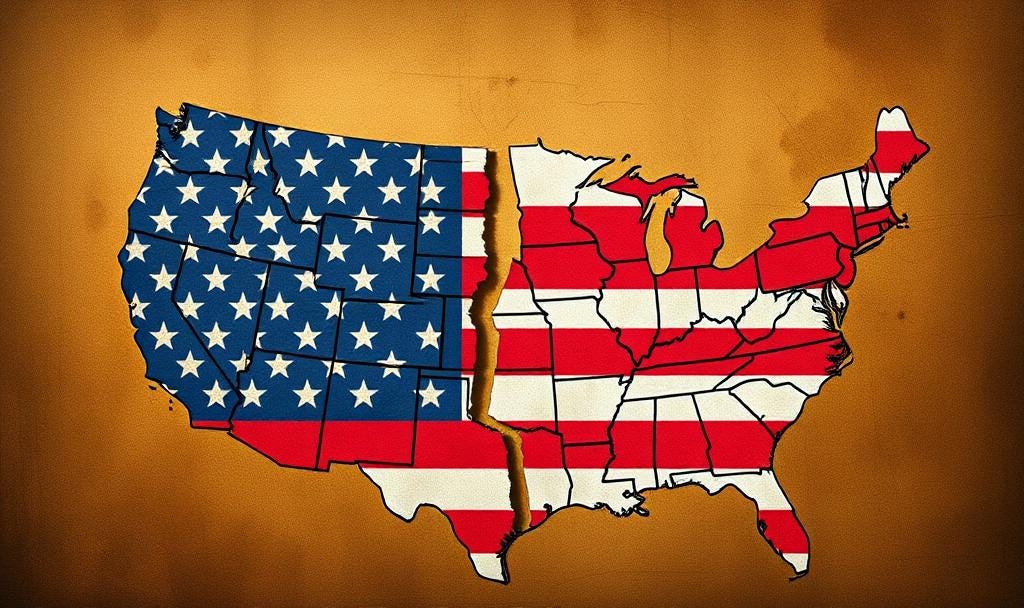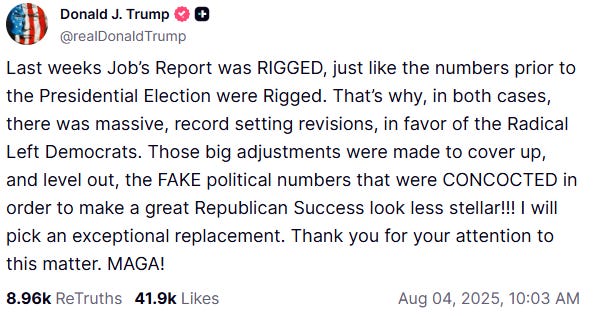Chaos, not commerce
Trump's actions continue to fracture the American economy
Post-Liberation Day, Donald Trump embarked on his first official international trip of his second term, visiting Saudi Arabia, Qatar and the United Arab Emirates. During that trip, the president addressed the U.S.-Saudi Investment Event in Riyadh attended by CEOs and executives from Alphabet, Amazon, Nvidia, Tesla, Citigroup, BlackRock, OpenAI, and others and said:
a new generation of leaders is transcending the ancient conflicts of tired divisions of the past and forging a future where the Middle East is defined by commerce, not chaos
While none of the three countries Trump visited on that trip rank as a top 10 trading partner of the United States (then or now), the sovereign wealth funds for those three countries each rank in the top 10 in the world and in total equate to roughly $2.5 trillion.
Back in early February, President Trump signed an Executive Order (EO) to establish an American sovereign wealth fund. While that EO states a funding plan would be determined within 90 days, it is obvious a budget surplus which typically funds sovereign wealth funds would not be a legitimate source of financing as the U.S. currently faces a $1.8 trillion deficit.
State of the U.S. economy and trade
To address the deficit and to Make America Affordable Again, the administration passed the “big, beautiful bill” and declared a Liberation Day to “forever be remembered as the day American industry was reborn, the day America’s destiny was reclaimed, and the day that we began to Make America Wealthy Again.” Since Liberation Day, more than half of Americans continue to disapprove of how Trump is handling the economy, with the latest polling indicating 52% disapprove and less than 40% approve.
Even Republicans this week are voicing discomfort with how Trump’s tariffs are affecting the state of the American economy.
“It definitely is indicative of a weakened economy, an economy that’s not acting in a robust fashion. I’ve all along felt like there’s a lag between tariffs and actual economic downturn.”
-Senator Rand Paul (R-KY):
In terms of how a volatile tariff policy will impact consumer pricing and business operations:
My view is that there’s no question that consumers, Americans, pay a price for tariffs.. A tax raises the cost of living for everybody. I know enough to know that certainty matters, and at the moment there’s not very much certainty about what’s happening next. Therefore, businesses delay decisions to expand, to hire, to spend money. So uncertainty creates a challenge for a growing economy.
-Senator Jerry Moran (R-KS)
A key economic indicator of Trump’s trade wars is the U.S. agricultural trade balance, which in only 5 months has declined to a $24.5 billion deficit, the largest recorded since 1976. The USDA “projects a $49.5 billion agricultural trade deficit for all of fiscal year 2025.” The American Farm Bureau Federation in its Outlook for U.S. Agricultural Trade: May 2025, reported “trade barriers, retaliatory tariffs and ongoing disputes have limited access to important markets such as China and the European Union. Some foreign buyers are turning to lower-cost suppliers like Brazil and Argentina.”
Speaking of Brazil, the White House just last week claimed members of Brazil’s government are “politically persecuting a former President of Brazil” and “have taken unprecedented actions that harm and are a threat to the economy of the United States.” Consequently, Trump found it “necessary and appropriate to impose an additional ad valorem duty rate of 40 percent on certain products of Brazil,”
In an interview with Reuters today, Brazil’s President Luiz Inacio Lula da Silva responded, “today my intuition says [Trump] doesn't want to talk. And I'm not going to humiliate myself. We had already pardoned the U.S. intervention in the 1964 coup. But this now is not a small intervention. It's the president of the United States thinking he can dictate rules for a sovereign country like Brazil. It's unacceptable." President Silva went on to say he fully intends to contact other members of BRICS, starting with China and India, to discuss a joint response to U.S. tariffs.
India may be open to such talks as Trump signed an Executive Order today to increase tariffs on imports from India to 50% for “directly or indirectly importing Russian Federation oil.” The punitive tariffs are a result of the “unusual and extraordinary threat to the national security and foreign policy of the United States” that Russia’s war with Ukraine poses.
According to the Centre for Research on Energy and Clean Air’s June 2025 analysis, multiple countries import Russian fossil fuels including the Netherlands, France, Belgium, China and Turkey. Granted India and China are the largest buyers of Russian fossil fuels, but it is noteworthy the EU reached a much more favorable trade deal with the U.S. in comparison.
Yet, Trump told CNBC yesterday that India is fueling the Russian war machine. An Indian official speaking on condition of anonymity responded, “if we stop buying Russian oil, who will replace those barrels to maintain balance (in the market) and at the same time prevent the prices from shooting up? We don't want a repeat of 2022 when prices shot up to $137 a barrel."
While foreign governments continue to realign without the United States, the billions in tariff revenue the United States has received during Trump’s second term could be in jeopardy. “Trump’s own Justice Department has acknowledged in legal briefs filed with a U.S. Court of Appeals in recent months that if the tariffs were ruled unlawful, importers would be entitled to refunds.”
State of U.S. consumer debt and the labor market
As the Trump administration continues to negotiate trade deals, Bloomberg reports the percentage of US consumer debt in serious delinquency has reached its highest level since early 2020. Household debt in the aggregate are 30% higher than just prior to the pandemic, and student loans continue to rise. Combined with declining consumer spending, initial reports are proving American households are experiencing growing financial distress prior to the downstream impact of tariffs recently implemented.
Adding to these concerns is legitimate concern about the U.S. labor market. David Kelly, chief global strategist at JPMorgan Asset Management, told Fortune, “given the continued retirement of the baby boom and considering the possibility that deportations and voluntary departures of immigrants entirely offset new immigration in the next few years, it is quite possible that the next five years will see no growth in workers at all.” He went on to say, “[investors] should no longer bet broadly on a strongly rising U.S. economic tide or lower interest rates.”
On a related note, some of the largest foreign investments Trump secured on his May trip to the Middle East were in artificial intelligence. Joseph Briggs, senior global economist at Goldman Sachs, told CNBC there are already signs of a hiring pullback in the tech sector despite the fact that “most companies have yet to deploy artificial intelligence in production cases.” To illustrate the potential impact to come, companies like Alphabet and Microsoft are reporting almost 30% of coding on some projects are being done by AI, and Salesforce CEO Marc Benioff said in June “that AI handles as much as 50% of the work at his company.”
State of the market
Recently, the Bureau of Labor Statistics released its monthly jobs report:
Employment showed little change over the month in other major industries, including mining, quarrying, and oil and gas extraction; construction; manufacturing; wholesale trade; retail trade; transportation and warehousing; information; financial activities; professional and business services; leisure and hospitality; and other services.
The change in total nonfarm payroll employment for May was revised down by 125,000, from +144,000 to +19,000, and the change for June was revised down by 133,000, from +147,000 to +14,000. With these revisions, employment in May and June combined is 258,000 lower than previously reported.
In response to an unfavorable report, President Trump fired the Bureau of Labor Statistics (BLS) Commissioner Erika McEntarfer crying foul play.
Kathy Utgoff, a former BLS commissioner appointed by Republican President George W. Bush, said “the commissioner has no ability to change the numbers that come out of computers at the last minute. [BLS staffers] hand the commissioner the press release with the numbers in it” less than 2 days prior to the jobs report announcement. Utgoff went on to say “revisions are not mistakes, they are improvements.”
William Beach, the BLS commissioner during Trump’s first term, said “[Trump’s firing] does a great deal of damage, by the way, because BLS is a highly trusted worldwide organization at bankers in Dusseldorf [Germany]. I had one call me one time who says, we actually stop trading in Dusseldorf 10 minutes prior to 8:30 on Eastern time, because we want to make sure we're ready for that report to come out. That's how accurate they see it and how important it is.”
Wall Street would seem to agree with that assessment. Michael Feroli, chief US economist at JPMorgan, told the Financial Times that “trust in institutions is why the US has been a destination for foreign investment. One of those institutions is the country’s statistical agencies.” JP Morgan is telling clients that McEntarfer’s firing “presents risks to the conduct of monetary policy, to financial stability, and to the economic outlook.”
Vincent Reinhart, chief economist at $2.1tn-in-assets BNY Investments, said “the concerning thing is that, if people start to worry about the politicisation of the BLS, that can show up in market prices.” Mike Riddell, a fund manager at Fidelity International, added to Reinhart’s concern saying that “a political appointee to head an independent agency in charge of economic statistics, which includes inflation, has the potential to spook markets.”
In the near-term, the American economy may be defined by chaos, not commerce.


